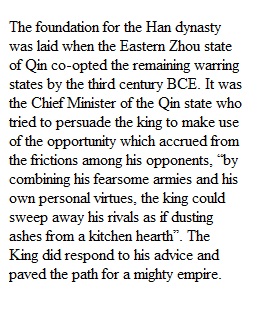


Q Describe the development of the Han dynasty from its beginnings through the third century CE.In the six centuries between 300 BCE and 300 CE, the Han dynasty united huge populations and immense swaths of territory not only under their direct control but also under their indirect influence. The Han dynasty developed new models for heightened authoritarian control placed in the hands of a single ruler. o In what ways did this authoritarian control at the top shape power relationships at all levels of their society? What were some potential challenges to this patriarchal, centralized control? o In what ways did Han interactions with nomadic groups like the Xiongnu affect their globalizing empire? o what factors led the Han Dynasty to fall? Using your text and the primary source, Book of Poetry, describe the different roles of men and women in the Han dynasty. How did these roles differ between different classes?Outline the development of Rome from a monarchy to a Republic. What were some of the ways in which the Romans developed a really unique identity, even as they borrowed heavily from other cultures? In addition, what were some of the particular ways in which the Romans borrowed from the GreeksSlaves are replacing Roman workers. Slaves are brought back from each conquered land. These slaves are assigned jobs working for much less than any free Roman can. These slaves are putting free citizens, who are laborers and small farmers, out of work. Poor Romans are starving to death. What should be done?
View Related Questions